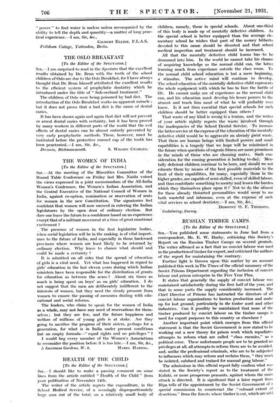HEALTH OF THE CHILD [To the Editor of the SPECTATOR.]
should like to make a passing comment on some lines from the article entitled " Health of the Child " from your publication of November 14th.
The writer of the article regrets the expenditure, in the School Medical. Service, of a seemingly disproportionately large stun out of the total, on a relatively small body of children, namely, those in special schools. About one-third of this body is made up of mentally defective children. As the special school is better equipped than the average ele- mentary school he wishes that part of the money hitherto devoted to this cause should be diverted and that school medical inspection and treatment should be increased.
All that the -mentally- defective child learns - has 'to be drummed into him. In the world he cannot take his chance of acquiring knowledge as the normal child can, the latter learning much from experience outside the class room. To the normal child sehnil education is but a mere beginning, a stimulus. The -aetive mind *ill. continue to develop. The school education of theanentallY defective child represents the whole eqiipuient with which- he has to face the battle of life. He cannot make use of experience as the normal child can, and his edUcation must develop his lesser powers to the utmost and teach him most of what he will probably ever know. Is it not then essential that special schools for such children should be better equipped than others ?
That waste of ttny41hUI is wrong fid.fruism, and the writer of your article rightly regrets' the waste invoived through the inadeqruicies of the Schonl-r-Dentaf-Senice. To increase the latterservice at the expense of the 'education-of the Mentally defective child would be to aggravate an already great waste. That there are human beings with -limited powers and small Capabilities is a tragedy that we hope- will be minitnized in the future when queStithis of etigenic 'fitness are more prominent in the' minds of those • Who are ehoOSing • matet Such con- sideration forthe coming generation is lacking to-day: 'Men- tally deficient children continue to be born, and should we not educate -them-by Means of the best possible materiafi to the limit of their capabilities, for :many, especially thoge the highergrades, are capable of seni-skilled, even of skilled labour, and thus contribute- something to:societyarid lessen the burden which they themselves place- upon it ?' • Not t6do, the utmost for these already thviatted Perionalities Nfouicl seem-to me both wasteful -"and inhuman, _ even at the expenie • of such-
vital services as school' dentistry. am,,Sir; &C.;
Dfnurruf.O: F. TttOistsols.
Godahning,‘ Surrey. -
































































 Previous page
Previous page